Fleurs du Mal Magazine


Or see the index
.jpg)
A l f o n s i n a S t o r n i
(1892-1938)
A Eros
He aqui que te cacé por el pescuezo
a la orilla del mar, mientras movías
las flechas de tu aljaba para herirme
y vi en el suelo tu floreal corona.
Como a un muñeco destripé tu vientre
y examiné sus ruedas engañosas
y muy envuelta en sus poleas de oro
hallé una trampa que decía: sexo.
Sobre la playa, ya un guiñapo triste,
te mostré al sol, buscón de tus hazañas,
ante un corro asustado de sirenas.
Iba subiendo por la cuesta albina
tu madrina de engaños, Doña Luna,
y te arrojé a la boca de las olas.
![]()
fleursdumal.nl magazine
More in: Archive S-T, Storni, Alfonsina
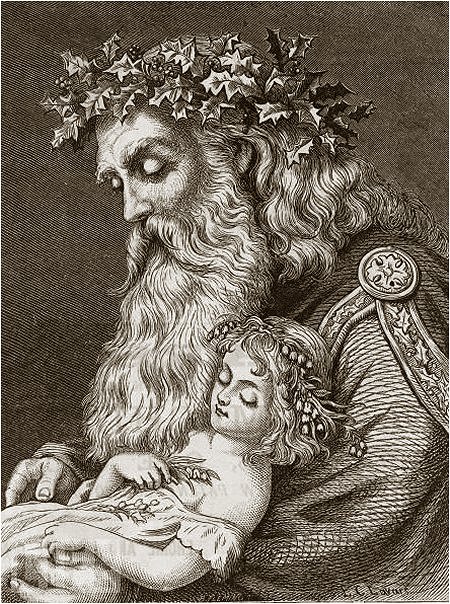
Alfred Lord Tennyson
(1809-1892)
Ring Out, Wild Bells
Ring out, wild bells, to the wild sky,
The flying cloud, the frosty light;
The year is dying in the night;
Ring out, wild bells, and let him die.
Ring out the old, ring in the new,
Ring, happy bells, across the snow:
The year is going, let him go;
Ring out the false, ring in the true.
Ring out the grief that saps the mind,
For those that here we see no more,
Ring out the feud of rich and poor,
Ring in redress to all mankind.
Ring out a slowly dying cause,
And ancient forms of party strife;
Ring in the nobler modes of life,
With sweeter manners, purer laws.
Ring out the want, the care the sin,
The faithless coldness of the times;
Ring out, ring out my mournful rhymes,
But ring the fuller minstrel in.
Ring out false pride in place and blood,
The civic slander and the spite;
Ring in the love of truth and right,
Ring in the common love of good.
Ring out old shapes of foul disease,
Ring out the narrowing lust of gold;
Ring out the thousand wars of old,
Ring in the thousand years of peace.
Ring in the valiant man and free,
The larger heart, the kindlier hand;
Ring out the darkness of the land,
Ring in the Christ that is to be.
.jpg)
January 1, 2010
kempis poetry magazine wishes you a Happy New Year!
More in: Archive S-T, Tennyson, Alfred Lord
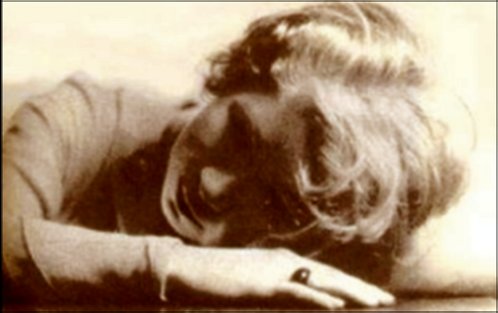
A l f o n s i n a S t o r n i
(1892-1938)
Mi Hermana
Son las diez de la noche; en el cuarto en penumbra,
Mi hermana está dormida, las manos sobre el pecho;
Es muy blanca su cara y es muy blanco su lecho,
Como si comprendiera, la luz casi no alumbra.
En el lecho se hunde a modo de los frutos
Rosados, en el hondo colchón de suave pasto.
Entra el aire a su pecho y levántalo casto
Con su ritmo midiendo los fugaces minutos.
La arropo dulcemente con las blancas cubiertas
Y protejo del aire sus dos manos divinas;
Caminando en puntillas, cierro todas las puertas,
Entorno los postigos y corro las cortinas.
Hay mucho ruido afuera, ahoga tanto ruido.
Los hombres se querellan, murmuran las mujeres,
Suben palabras de odio, gritos de mercaderes:
Oh, voces, deteneos. No entréis hasta su nido.
Mi hermana está tejiendo como un hábil gusano
Su capullo de seda: su capullo es un sueño.
Ella con hilo de oro teje el copo sedeño:
Primavera es su vida. Yo ya soy el verano.
Cuenta sólo con quince octubres en los ojos,
Y por eso los ojos son tan limpios y claros;
Cree que las cigüeñas, desde países raros
Bajan con rubios niños de piececitos rojos
¿Quién quiere entrar ahora? Oh ¿eres tú, buen viento?
¿Quieres mirarla? Pasa. Pero antes, en mi frente
Entíbiate un instante; no vayas de repente
A enfriar el manso sueño que en la suya presiento.
Como tú, bien quiseran entrar ellos y estarse
Mirando esa blancura, esas pulcras mejillas,
Esas finas ojeras, esas líneas sencillas.
Tú los verís, viento, llorar y arrodillarse.
Ag, si la amáis un día sed buenos, porque huye
De la luz si la hiere. Cuidad vuestra palabra,
Y la intención. Su alma, como cera se labra,
Pero como a la cera el roce la destruye.
Haced como esa estrella que de noche la mira
Filtrando el ojo por un cristalino velo:
Esa estrella le roza las pestañas y gira,
Para no despertarla, silenciosa en el cielo.
Volad si os es posible por su nevado huerto:
¡Piedad para su alma! Ella es inmaculada.
¡Piedad para su alma! Yo lo sé todo, es cierto.
Pero ella es como el cielo: ella no sabe nada.
.jpg)
fleursdumal.nl magazine
More in: Archive S-T, Storni, Alfonsina

A l f o n s i n a S t o r n i
(1892-1938)
Parásitos
Jamás pensé que Dios tuviera alguna forma.
Absoluta su vida; y absoluta su norma.
Ojos no tuvo nunca: mira con las estrellas.
Manos no tuvo nunca: golpea con los mares.
Lengua no tuvo nunca: habla con los centellas.
Te diré, no te asombres;
Sé que tiene parásitos: las cosas y los hombres.
![]()
fleursdumal.nl magazine
More in: Archive S-T, Storni, Alfonsina
.jpg)
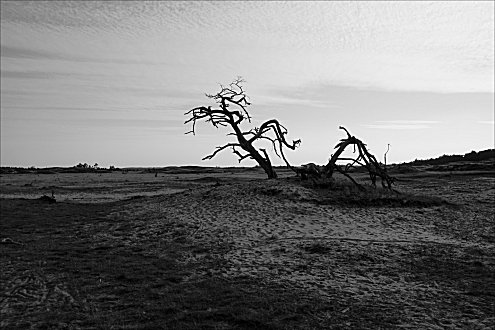
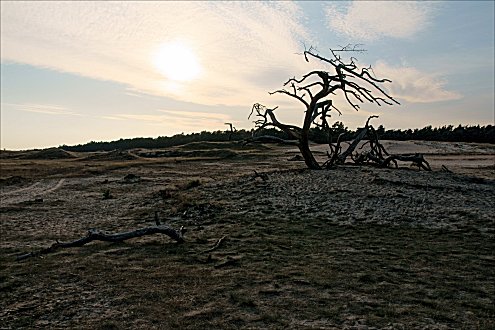
A. C. W. S t a r i n g
(1767-1840)
Een Gelders lied
Ik ben uit Gelders bloed!
Geen vleitoon klinkt mij zoet;
Mijn volksspraak, luttel rond,
Geeft nog de klank terug,
Uit onzer vaadren mond.
Bij de eiken, aan de top
Eens heuvels, wies ik op.
In heiden zonder baan,
Leerde ik, ter jacht geschort,
Mijn eerste treden gaan.
Mijn arm is ‘t wild geducht:
De reebok helpt geen vlucht,
Het zwijn geen scherpe tand,
Als, in mijn dreigend roer,
Een snelle dood ontbrandt.
Ik smaâ de lauwer niet,
Die ‘t koor des Vredes biedt,
Maar schat een andre meer!
De krans, door ‘t zwaard verdiend,
Is ook een krans der Eer!
En gesp ik ‘t harnas aan,
Ik volg geen vreemde daân;
Op Rossems heldenspoor,
Zweeft mij, in stralend licht,
Het beeld der zege voor.
Ik ben uit Gelders bloed!
Oprecht is mijn gemoed;
Aan eenvoud heb ik lust;
Met pracht en weeld komt zorg;
Genoegzaamheid baart rust.
(1837)
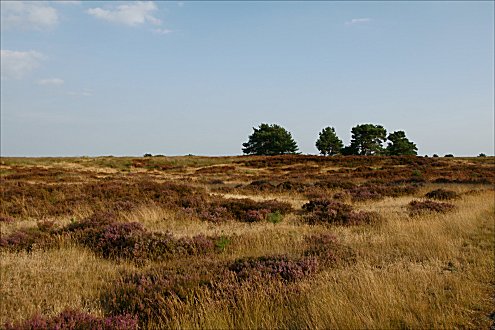
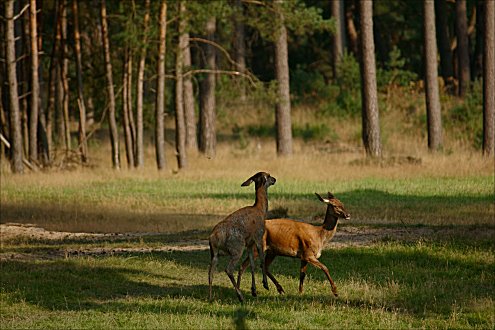
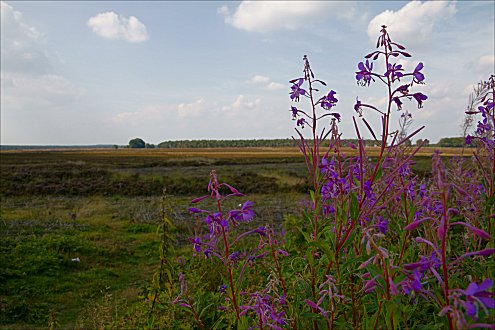
Hans Hermans Natuurdagboek: September 2009
De Hoge Veluwe
Gedicht: Een Gelders lied van A.C.W. Staring
kempis poetry magazine
© photos Hans Hermans
More in: Archive S-T, Hans Hermans Photos, MUSEUM OF NATURAL HISTORY - department of ravens & crows, birds of prey, riding a zebra, spring, summer, autumn, winter
.jpg)
Algernon Charles Swinburne
(1837-1909)
S u n r i s e
If the wind and the sunlight of April and August had mingled the
past and hereafter
In a single adorable season whose life were a rapture of love and
of laughter,
And the blithest of singers were back with a song; if again from
his tomb as from prison,
If again from the night or the twilight of ages Aristophanes had
arisen,
With the gold-feathered wings of a bird that were also a god upon
earth at his shoulders,
And the gold-flowing laugh of the manhood of old at his lips, for a
joy to beholders,
He alone unrebuked of presumption were able to set to some adequate
measure
The delight of our eyes in the dawn that restores them the sun of
their sense and the pleasure.
For the days of the darkness of spirit are over for all of us here,
and the season
When desire was a longing, and absence a thorn, and rejoicing a
word without reason.
For the roof overhead of the pines is astir with delight as of
jubilant voices,
And the floor underfoot of the bracken and heather alive as a heart
that rejoices.
For the house that was childless awhile, and the light of it
darkened, the pulse of it dwindled,
Rings radiant again with a child’s bright feet, with the light of
his face is rekindled.
And the ways of the meadows that knew him, the sweep of the down
that the sky’s belt closes,
Grow gladder at heart than the soft wind made them whose feet were
but fragrant with roses,
Though the fall of the year be upon us, who trusted in June and by
June were defrauded,
And the summer that brought us not back the desire of our eyes be
gone hence unapplauded.
For July came joyless among us, and August went out from us arid
and sterile,
And the hope of our hearts, as it seemed, was no more than a flower
that the seasons imperil,
And the joy of our hearts, as it seemed, than a thought which
regret had not heart to remember,
Till four dark months overpast were atoned for, and summer began in
September.
Hark, April again as a bird in the house with a child’s voice
hither and thither:
See, May in the garden again with a child’s face cheering the woods
ere they wither.
June laughs in the light of his eyes, and July on the sunbright
cheeks of him slumbers,
And August glows in a smile more sweet than the cadence of
gold-mouthed numbers.
In the morning the sight of him brightens the sun, and the noon
with delight in him flushes,
And the silence of nightfall is music about him as soft as the
sleep that it hushes.
We awake with a sense of a sunrise that is not a gift of the
sundawn’s giving,
And a voice that salutes us is sweeter than all sounds else in the
world of the living,
And a presence that warms us is brighter than all in the world of
our visions beholden,
Though the dreams of our sleep were as those that the light of a
world without grief makes golden.
For the best that the best of us ever devised as a likeness of
heaven and its glory,
What was it of old, or what is it and will be for ever, in song or
in story,
Or in shape or in colour of carven or painted resemblance, adored
of all ages,
But a vision recorded of children alive in the pictures of old or
the pages?
Where children are not, heaven is not, and heaven if they come not
again shall be never:
But the face and the voice of a child are assurance of heaven and
its promise for ever.
kemp=mag poetry magazine
More in: Archive S-T, Swinburne, Algernon Charles

Robert Louis Stevenson
(1850-1894)
Tropic Rain
As the single pang of the blow, when the metal is mingled well,
Rings and lives and resounds in all the bounds of the bell,
So the thunder above spoke with a single tongue,
So in the heart of the mountain the sound of it rumbled and clung.
Sudden the thunder was drowned – quenched was the levin light –
And the angel-spirit of rain laughed out loud in the night.
Loud as the maddened river raves in the cloven glen,
Angel of rain! you laughed and leaped on the roofs of men;
And the sleepers sprang in their beds, and joyed and feared as you fell.
You struck, and my cabin quailed; the roof of it roared like a bell.
You spoke, and at once the mountain shouted and shook with brooks.
You ceased, and the day returned, rosy, with virgin looks.
And me thought that beauty and terror are only one, not two;
And the world has room for love, and death, and thunder, and dew;
And all the sinews of hell slumber in summer air;
And the face of God is a rock, but the face of the rock is fair.
Beneficent streams of tears flow at the finger of pain;
And out of the cloud that smites, beneficent rivers of rain.
![]()
kemp=mag poetry magazine
More in: Archive S-T, Stevenson, Robert Louis

Kurt Tucholsky
(1890 – 1935)
Der schlimmste Feind
Für Ernst Toller
Der schlimmste Feind, den der Arbeiter hat,
das sind nicht die Soldaten;
es ist auch nicht der Rat der Stadt,
nicht Bergherrn, nicht Prälaten.
Sein schlimmster Feind steht schlau und klein
in seinen eignen Reihn.
Wer etwas diskutieren kann,
wer einmal Marx gelesen,
der hält sich schon für einen Mann
und für ein höheres Wesen.
Der ragt um einen Daumen klein
aus seinen eignen Reihn.
Der weiß nichts mehr von Klassenkampf
und nichts von Revolutionen;
der hat vor Streiken allen Dampf
und Furcht vor blauen Bohnen.
Der will nur in den Reichstag hinein
aus seinen eignen Reihn.
Klopft dem noch ein Regierungsrat
auf die Schulter: “Na, mein Lieber . . .”,
dann vergißt er das ganze Proletariat –
das ist das schlimmste Kaliber.
Kein Gutsbesitzer ist so gemein
wie der aus den eignen Reihn.
Paßt Obacht!
Da steht euer Feind,
der euch hundertmal verraten!
Den Bonzen loben gern vereint
Nationale und Demokraten.
Freiheit? Erlösung? Gute Nacht.
Ihr seid um die Frucht eures Leidens gebracht.
Das macht: Ihr konntet euch nicht befrein
von dem Feind aus den eignen Reihn.

fleursdumal.nl magazine
More in: Archive S-T, Tucholsky, Kurt
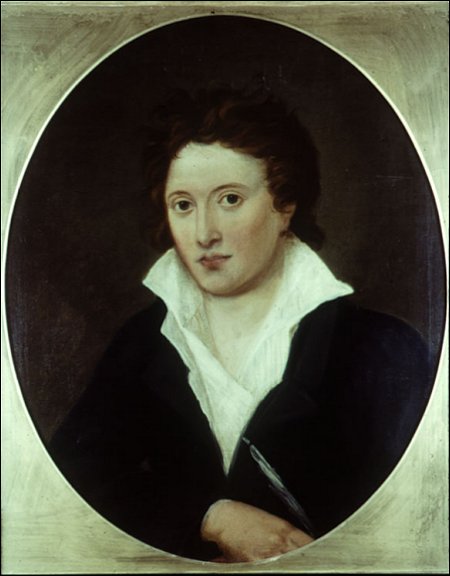
Percy Bysshe Shelley
(August 4, 1792 Horsham, England – July 8, 1822 Livorno, Italy)
Nine Poems
Death
1
They die–the dead return not–Misery
Sits near an open grave and calls them over,
A Youth with hoary hair and haggard eye–
They are the names of kindred, friend and lover,
Which he so feebly calls–they all are gone–
Fond wretch, all dead! those vacant names alone,
This most familiar scene, my pain–
These tombs–alone remain.
2
Misery, my sweetest friend–oh, weep no more!
Thou wilt not be consoled–I wonder not!
For I have seen thee from thy dwelling’s door
Watch the calm sunset with them, and this spot
Was even as bright and calm, but transitory,
And now thy hopes are gone, thy hair is hoary;
This most familiar scene, my pain–
These tombs–alone remain.

Satan broken loose
(fragment)
A golden-winged Angel stood
Before the Eternal Judgement-seat:
His looks were wild, and Devils’ blood
Stained his dainty hands and feet.
The Father and the Son
Knew that strife was now begun.
They knew that Satan had broken his chain,
And with millions of daemons in his train,
Was ranging over the world again.
Before the Angel had told his tale,
A sweet and a creeping sound
Like the rushing of wings was heard around;
And suddenly the lamps grew pale–
The lamps, before the Archangels seven,
That burn continually in Heaven.

Lines to a critic
1
Honey from silkworms who can gather,
Or silk from the yellow bee?
The grass may grow in winter weather
As soon as hate in me.
2
Hate men who cant, and men who pray,
And men who rail like thee;
An equal passion to repay
They are not coy like me.
3
Or seek some slave of power and gold
To be thy dear heart’s mate;
Thy love will move that bigot cold
Sooner than me, thy hate.
4
A passion like the one I prove
Cannot divided be;
I hate thy want of truth and love–
How should I then hate thee?

To…?
1
I fear thy kisses, gentle maiden,
Thou needest not fear mine;
My spirit is too deeply laden
Ever to burthen thine.
2
I fear thy mien, thy tones, thy motion,
Thou needest not fear mine;
Innocent is the heart’s devotion
With which I worship thine.
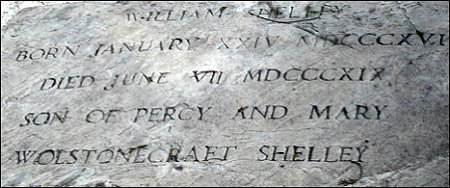
Song of Proserpine while gathering flowers
on the Plain of Enna
1
Sacred Goddess, Mother Earth,
Thou from whose immortal bosom
Gods, and men, and beasts have birth,
Leaf and blade, and bud and blossom,
Breathe thine influence most divine
On thine own child, Proserpine.
2
If with mists of evening dew
Thou dost nourish these young flowers
Till they grow, in scent and hue,
Fairest children of the Hours,
Breathe thine influence most divine
On thine own child, Proserpine.
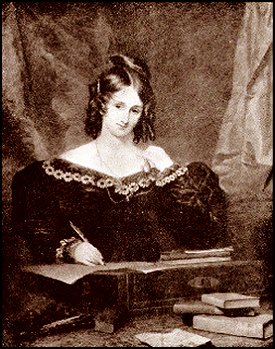
Autumn: A Dirge
1
The warm sun is failing, the bleak wind is wailing,
The bare boughs are sighing, the pale flowers are dying,
And the Year
On the earth her death-bed, in a shroud of leaves dead,
Is lying.
Come, Months, come away,
From November to May,
In your saddest array;
Follow the bier
Of the dead cold Year,
And like dim shadows watch by her sepulchre.
2
The chill rain is falling, the nipped worm is crawling,
The rivers are swelling, the thunder is knelling
For the Year;
The blithe swallows are flown, and the lizards each gone
To his dwelling;
Come, Months, come away;
Put on white, black, and gray;
Let your light sisters play–
Ye, follow the bier
Of the dead cold Year,
And make her grave green with tear on tear.

Death
1
Death is here and death is there,
Death is busy everywhere,
All around, within, beneath,
Above is death–and we are death.
2
Death has set his mark and seal
On all we are and all we feel,
On all we know and all we fear,
3
First our pleasures die–and then
Our hopes, and then our fears–and when
These are dead, the debt is due,
Dust claims dust–and we die too.
4
All things that we love and cherish,
Like ourselves must fade and perish;
Such is our rude mortal lot–
Love itself would, did they not.
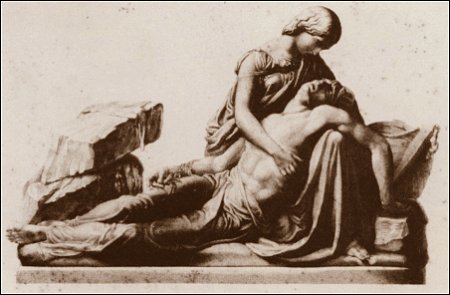
To the moon
1
Art thou pale for weariness
Of climbing heaven and gazing on the earth,
Wandering companionless
Among the stars that have a different birth,–
And ever changing, like a joyless eye
That finds no object worth its constancy?
2
Thou chosen sister of the Spirit,
That grazes on thee till in thee it pities…
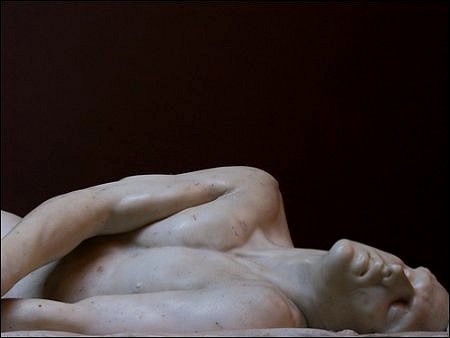
Sonnet
Ye hasten to the grave! What seek ye there,
Ye restless thoughts and busy purposes
Of the idle brain, which the world’s livery wear?
O thou quick heart, which pantest to possess
All that pale Expectation feigneth fair!
Thou vainly curious mind which wouldest guess
Whence thou didst come, and whither thou must go,
And all that never yet was known would know–
Oh, whither hasten ye, that thus ye press,
With such swift feet life’s green and pleasant path,
Seeking, alike from happiness and woe,
A refuge in the cavern of gray death?
O heart, and mind, and thoughts! what thing do you
Hope to inherit in the grave below?
Percy Bysshe Shelley: Nine Poems
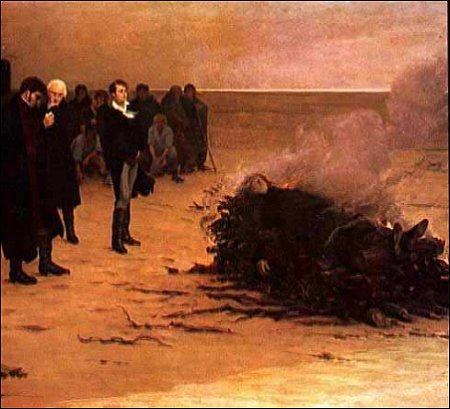
• fleursdumal.nl magazine for art & literature
More in: Archive S-T, Archive S-T, Percy Byssche Shelley, Shelley, Percy Byssche

Johann Christoph Friedrich
von Schiller
1759-1805
Das Mädchen aus der Fremde
In einem Tal bei armen Hirten
Erschien mit jedem jungen Jahr,
Sobald die ersten Lerchen schwirrten,
Ein Mädchen, schön und wunderbar.
Sie war nicht in dem Tal geboren,
Man wußte nicht, woher sie kam,
Und schnell war ihre Spur verloren,
Sobald das Mädchen Abschied nahm.
Beseligend war ihre Nähe,
Und alle Herzen wurden weit,
Doch eine Würde, eine Höhe
Entfernte die Vertraulichkeit.
Sie brachte Blumen mit und Früchte,
Gereift auf einer andern Flur,
In einem andern Sonnenlichte,
In einer glücklichern Natur.
Und teilte jedem eine Gabe,
Dem Früchte, jenem Blumen aus,
Der Jüngling und der Greis am Stabe,
Ein jeder ging beschenkt nach Haus.
Willkommen waren alle Gäste,
Doch nahte sich ein liebend Paar,
Dem reichte sie der Gaben beste,
Der Blumen allerschönste dar.
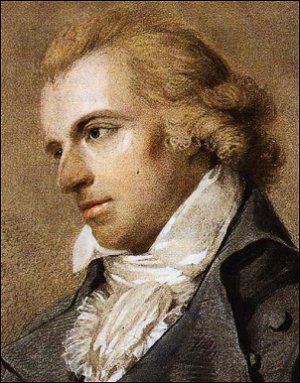
Poem of the week
August 10, 2008
kemp=mag poetry magazine
More in: Archive S-T, Schiller, Friedrich von

Alfred Lord Tennyson
1809-1892
ST. AGNES
Deep on the convent-roof the snows
Are sparkling to the moon:
My breath to heaven like vapour goes:
May my soul follow soon!
The shadows of the convent-towers
Slant down the snowy sward,
Still creeping with the creeping hours
That lead me to my Lord:
Make Thou my spirit pure and clear
As are the frosty skies,
Or this first snowdrop of the year
That in my bosom lies.
As these white robes are soiled and dark,
To yonder shining ground;
As this pale taper’s earthly spark,
To yonder argent round;
So shows my soul before the Lamb,
My spirit before Thee;
So in mine earthly house I am,
To that I hope to be.
Break up the heavens, O Lord! and far,
Thro’ all yon starlight keen,
Draw me, thy bride, a glittering star,
In raiment white and clean.
He lifts me to the golden doors;
The flashes come and go;
All heaven bursts her starry floors,
And strows her lights below,
And deepens on and up! the gates
Roll back, and far within
For me the Heavenly Bridegroom waits,
To make me pure of sin.
The sabbaths of Eternity,
One sabbath deep and wide–
A light upon the shining sea–
The Bridegroom with his bride!
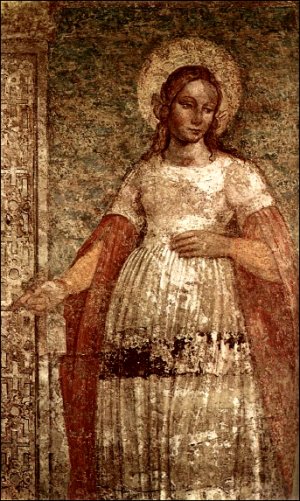
Poem of the week
August 3, 2008
More in: Archive S-T, Tennyson, Alfred Lord
.jpg)
Theodor Storm
(1817-1888)
Einer Toten
1
Du glaubtest nicht an frohe Tage mehr,
Verjährtes Leid ließ nimmer dich genesen;
Die Mutterfreude war für dich zu schwer,
Das Leben war dir gar zu hart gewesen. –
Er saß bei dir in letzter Liebespflicht;
Noch eine Nacht, noch eine war gegeben!
Auch die verrann; dann kam das Morgenlicht.
»Mein guter Mann, wie gerne wollt ich leben!«
Er hörte still die sanften Worte an,
Wie sie sein Ohr in bangen Pausen trafen:
»Sorg für das Kind – ich sterbe, süßer Mann.«
Dann halb verständlich noch: »Nun will ich schlafen.«
Und dann nichts mehr; – du wurdest nimmer wach,
Dein Auge brach, die Welt ward immer trüber;
Der Atem Gottes wehte durchs Gemach,
Dein Kind schrie auf, und dann warst du hinüber.
2
Das aber kann ich nicht ertragen,
Daß so wie sonst die Sonne lacht;
Daß wie in deinen Lebenstagen
Die Uhren gehn, die Glocken schlagen,
Einförmig wechseln Tag und Nacht;
Daß, wenn des Tages Lichter schwanden,
Wie sonst der Abend uns vereint;
Und daß, wo sonst dein Stuhl gestanden,
Schon andre ihre Plätze fanden,
Und nichts dich zu vermissen scheint;
Indessen von den Gitterstäben
Die Mondesstreifen schmal und karg
In deine Gruft hinunterweben
Und mit gespenstig trübem Leben
Hinwandeln über deinen Sarg.
Poem of the week -June 15, 2008
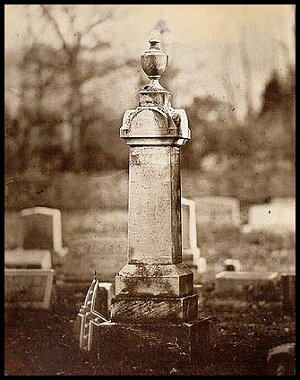
More in: Archive S-T
Thank you for reading Fleurs du Mal - magazine for art & literature